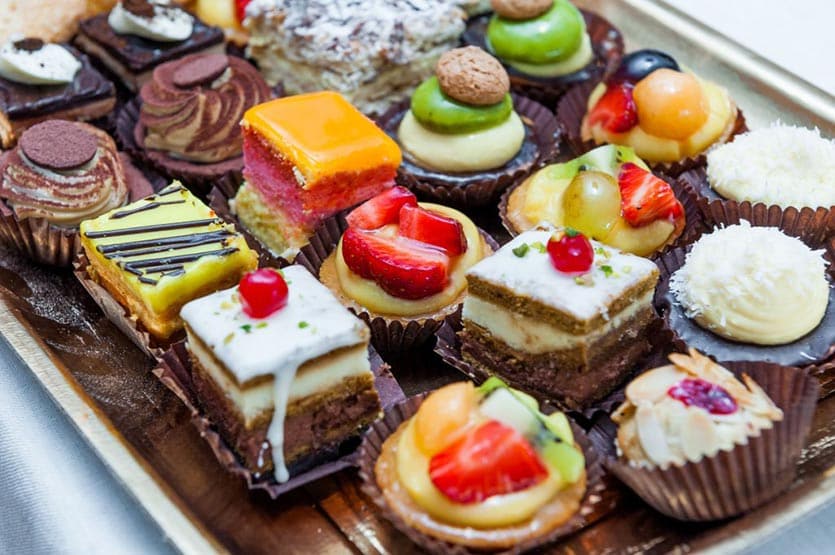Sugary treats are essentially ubiquitous in this day and age; in restaurants, cafes, shops, canteens, staring out from their display cases, cakes in neat little arrangements, sweets and chocolate bars in brightly coloured packaging, calling to us... Even if we can muster the willpower to not over-indulge, sugar surrounds us everywhere we go, and allowing ourselves to succumb to the cravings sometimes seems inevitable.
It can also be a difficult task to avoid sugar unless one is hyper-vigilant due to the insidious nature of those responsible for marketing this addictive substance. Sugar is cheap, addicting, and tastes good, so it is added to a lot of other foods you might not even expect it to be present in; breads, sauces, savoury snacks, potato chips. While, at the same time, tricky marketers, advertisers, and semanticians have figured out how to have you eating sugar without you even knowing it, by having a whole range of benign-sounding sugar substitutes whose names are unrecognisable to most people. Not a whole lot of people know that ingredients like agave, dextrose, maltodextrin, and a couple of other dozen obscure ingredients that are added to the food essentially represents sugar.
Now, I am sure we all know by now that excess dietary sugar will almost certainly lead to the gaining of unhealthy bodyweight, but what a lot of people seem to fail to consider is the fact that putting on a little extra body fat is a relatively benign concern when we take into consideration some of the many health problems that sugar plays a key role in the development of. The rise in diabetes is entirely the doing of sugar, digestive dysfunction and cardiovascular ill-health are being increasingly linked to refined carbohydrates, especially our dear, sweet sugar. Even cancer is being linked more and more to the over-indulgence in sugary foods. But, a number of less well-know, and less well-understood health problems are believed to be encouraged, contributed to, and even caused by excess consumption of the sugary treats; sinusitis, acne, allergies, yeast overgrowth, SIBO (small intestinal bacterial overgrowth), joint pain, chronic inflammation. Overcoming our propensities to eating the wrong foods will not just be beneficial to our waistline and physicality, but will keep our bodies functioning healthily much more reliably so than if we do not take care to eat well.
Another hurdle many of us in this part of the world have to overcome is the concept of allowing ourselves a sweet reward when we feel we have done good. Just like mommy and daddy used to when we were children, we enforce positive behaviours by granting treats to ourselves at specific moments in time, conditioning, and reconditioning certain behaviours in ourselves; like pavlovian dogs. Now, priming behaviours with treats may be a good idea to help train an animal or effectively coerce a child... But, when we get to the point where we are an adult with obesity or serious health problems because of our behaviour patterns, it is time to grow up, and learn how to take care of yourself once and for all. Treats are for the simple minded, and the healthy. If you are unwell, and wish to begin the pursuit of the betterment of your state of health, the best place to start is by reconsidering your eating habits. And, to stay on the point of this here article: Sugar is one of the primary dietary offenders.
We will address sugar in more detail at a later date. The aim of this article was to simply be a little reminder to all the sugar addicts out there: stay strong, eat sensibly, your body will thank you for it later. Sugar is harmful to your health, and just because it is so widely used: this does not mean it is not problematic to develop a habitual relationship with it.
To sign us off, here's a list of ingredients that essentially represent dietary sugar, but are disguised by assumed identities:
Glucose solids
Golden sugar
Golden syrup
Granulated sugar
Grape sugar
Grape juice concentrate
HFCS
High-fructose corn Syrup
Honey
Icing sugar
Invert sugar
Lactose
Malt syrup
Maltodextrin
Maltose
Mannitol
Maple syrup
Molasses
Muscovado sugar
Organic raw sugar
Panocha
Powdered sugar
Raw sugar
Refiner’s syrup
Rice Syrup
Sorbitol
Sorghum syrup
Sucrose
Sugar
Syrup Syrup
Table sugar
Treacle
Turbinado sugar
Yellow sugar
Namaste, -Sage

